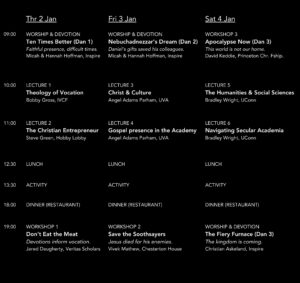The Christian Mind Project
Universities and Culture
America’s most prestigious universities predate the country’s founding and have radically affected the country’s thinking, preparing future leaders to lead. Universities create and redefine culture. Professional intellectuals at universities cure physical diseases, discover new commercial technologies, and promote a vision of social progress. Although Christian denominations founded many of the earliest universities, traditionalist Christians are underrepresented at these institutions relative to their presence in the population. Christians participate in politics nationally and respond to regional problems through their local congregations, but they have little presence in secular private schools and public universities.
The Social Sciences and Humanities
Those academic subject areas relevant to culture have the least Christian presence and self-report the highest level of bias toward religious conservatives. Scholars in these areas research and write on controversial topics related to race, class and gender, which directly inform public conversations on Abortion/Women’s Rights, DEI protocols, LGBTQ-advocacy, and the role of government. Because an ideological monoculture produces sectarian research, the end-product cannot beget anything other than a cultural war. Universities, especially their liberal arts faculties, need ideological diversity; they need Christian scholars of the highest academic caliber in order to achieve true intellectual diversity.

Peter Paul Rubens, Daniel in the Lions’ Den, 1614
The Christian Mind Project
The Christian Mind Project intends to establish a network between churches, college ministries and Christians in Higher Ed already committed to gospel-presence in the academy with the express goal of identifying early undergraduate students of promise who might excel in graduate school. Historically, secular professors have mentored secular students, resulting in a secular monoculture by the first year of graduate school. The Christian Mind Project would engage fifty college students (ideally during their freshman year) annually in a vocational call meeting to present the strategic role of the university and the opportunity of service. Teams of résumé coaches would meet with students at academic conferences and remotely to ensure that students are building an outstanding academic portfolio and a research program which will ultimately support compelling applications to graduate schools during the fall semester of their senior year.
Local Congregations and college ministries
The Christian Mind Project will not replace the spiritual oversight which believers receive through their local congregations or the unique opportunities for outreach offered by national college ministries. Furthermore, the project recognizes the presence of graduate and faculty ministries which have been addressing the stated problem for decades and will encourage students to participate with them during their graduate school experience.
The Vocational Call
1–5 Jan 2025 | Museum of the Bible, Washington, DC
During the first week of the new year, fifty evangelical college students with demonstrated academic promise will gather at the Museum of the Bible for three days of lectures, tours, and workshops which will explore avenues for impacting culture as intellectuals (vocational ministry, business, government, higher education).
Inspire will pay for food and housing at the event and offer a stipend to offset travel costs.

APPLY FOR CHRISTIAN MIND 2025
Review of applications for fifty stipendiary positions will begin on Monday, 11 November and will close on Friday, 20 December.
We are no longer accepting submissions for this experience.
About Inspire
Inspire proudly supports the Christian Mind Project as part of its wider goal of “inspiring a generation of Christians to be historically-informed, biblically-literate and spiritually-engaged.”
Contact
For more information reach out to [email protected]